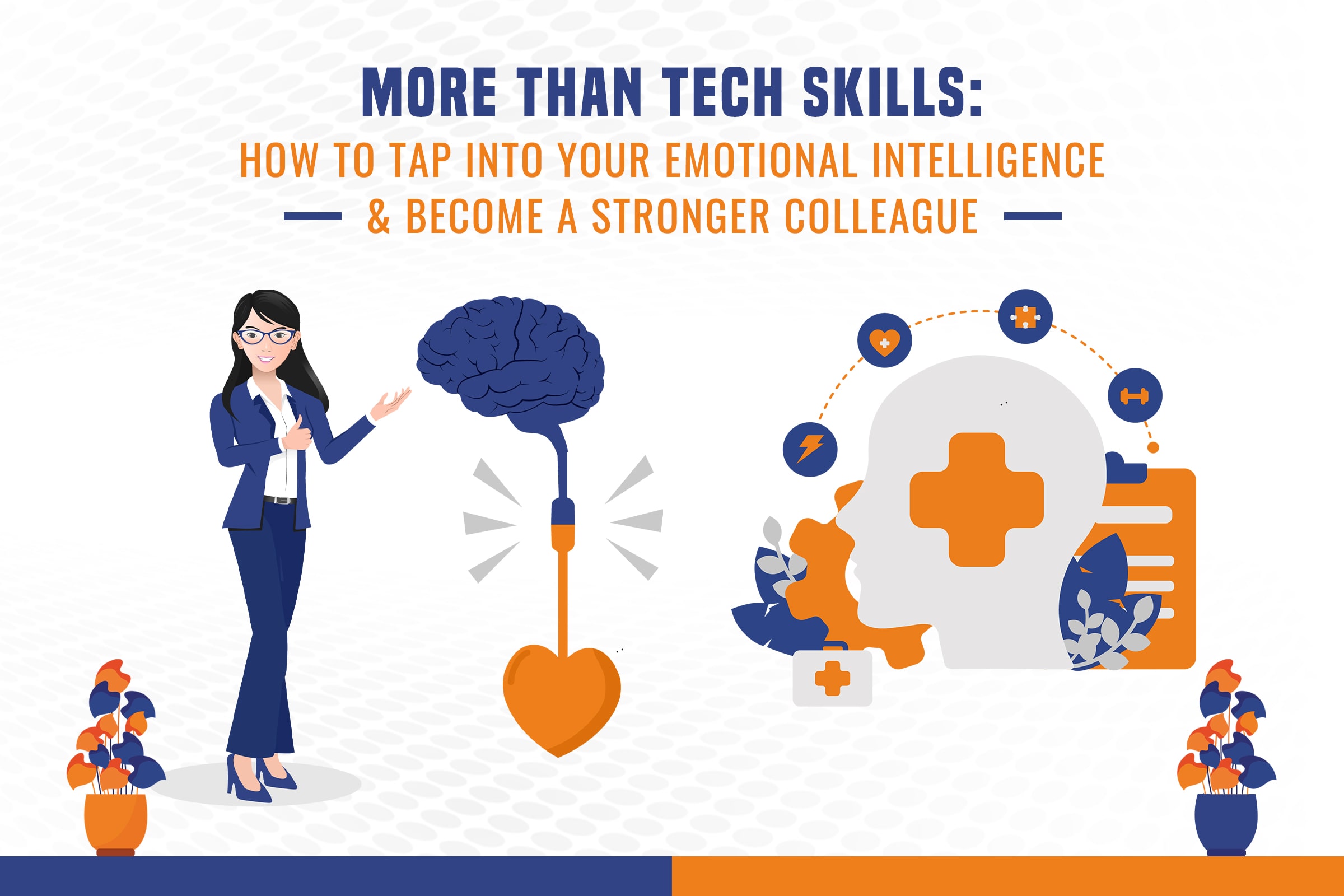
More Than Tech Skills: How to Tap Into Your Emotional Intelligence & Become a Stronger Colleague
In today's fast-paced and interconnected world, technical skills are undoubtedly valuable, but they are not the only ingredients needed to thrive in the workplace. Emotional intelligence (EI), often referred to as EQ, plays a significant role in professional success and can transform you into a stronger colleague. Let us delve deeper into the importance of EI and some actionable tips on how to develop and harness your emotional intelligence.
Understanding Emotional Intelligence
Emotional intelligence encompasses a range of skills that revolve around recognizing, understanding, and managing your own emotions, as well as those of others. These skills are critical in interpersonal relationships, teamwork, and leadership. In essence, EI is about being aware of emotions and using that awareness to navigate complex social situations effectively.
The Significance of Emotional Intelligence at Work
Enhanced Communication:
Effective communication is the cornerstone of any successful collaboration. A high EI enables you to listen actively, express your thoughts and feelings clearly, and comprehend the unspoken cues in conversations. This not only reduces misunderstandings but also fosters a more harmonious work environment.
Conflict Resolution:
Workplace conflicts are inevitable, but how you handle them can make all the difference. EI empowers you to manage conflicts diplomatically, empathize with others' perspectives, and find mutually beneficial solutions. This skill can be a game-changer when it comes to maintaining a positive team dynamic. This is why Leadership Skills Development Training is important.
Leadership Qualities:
Leaders with high emotional intelligence are often more effective in motivating and inspiring their teams. They can connect with team members on a deeper level, build trust, and create a culture of collaboration and innovation.
Stress Management:
Work can be stressful, and the ability to manage your emotions during high-pressure situations is crucial. People with strong EI can keep their composure, make rational decisions, and prevent stress from negatively affecting their work performance.
Developing Your Emotional Intelligence
Now that we understand the significance of emotional intelligence, let's explore how you can develop and tap into your own EI to become a stronger colleague.
Self-Awareness:
Begin by understanding your own emotions and how they impact your behavior. Reflect on your feelings, triggers, and reactions in different situations. Regularly journaling your emotions can help you gain insight into your emotional patterns.
Self-Regulation:
Once you're aware of your emotions, work on controlling them. Practice techniques such as deep breathing, meditation, or mindfulness to stay calm under pressure. Avoid impulsive reactions, and give yourself time to think before responding to challenging situations. A good Corporate Leadership Development Program trains a professional to become a balanced leader with the right amount of EI.
Empathy:
Empathy is a key component of emotional intelligence. Put yourself in others' shoes and try to understand their perspectives and feelings. Active listening is a powerful tool for building empathy. When someone speaks, focus on their words and emotions rather than formulating your response.
Social Skills:
Improve your social skills by enhancing your communication, conflict resolution, and interpersonal skills. Seek feedback from colleagues and use it as an opportunity for growth. Joining groups or clubs outside of work can also help you practice and refine your social skills.
Motivation:
Set meaningful goals for yourself and find intrinsic motivation to achieve them. This drive can inspire and energize not only you but also those around you. When you're motivated and passionate about your work, it's contagious, and it can positively influence your colleagues.
Continuous Learning:
Emotional intelligence is not something you master overnight; it's an ongoing journey. Stay open to learning and personal growth. Read books on emotional intelligence, attend workshops, Leadership and Management Training Courses, or consider working with a coach or mentor who can provide guidance and support.
Applying Emotional Intelligence in the Workplace
Developing your emotional intelligence is only the first step. Applying it in your day-to-day work is equally crucial. Here are some ways to leverage your EI in the workplace:
Build Stronger Relationships:
Use your enhanced communication skills and empathy to build stronger relationships with colleagues. Connect with them on a personal level, show appreciation, and provide support when needed.
Lead by Example:
If you're in a leadership role, lead by example by demonstrating emotional intelligence in your interactions with your team. Show vulnerability, admit mistakes, and encourage open and honest communication.
Conflict Resolution:
When conflicts arise, approach them with a calm and empathetic attitude. Listen actively to all parties involved, and work together to find solutions that address everyone's concerns.
Feedback and Recognition:
Provide constructive feedback with empathy and respect. Acknowledge your colleagues' contributions and express gratitude for their hard work. A simple "thank you" can go a long way in boosting morale. Also, invest in their development by enabling them with a good Corporate Leadership Development Program and other resources.
Team Collaboration:
Foster a collaborative work environment where everyone feels valued and heard. Encourage brainstorming sessions, open discussions, and the sharing of diverse perspectives.
Mentorship and Support:
Extend your emotional intelligence to mentorship and support roles. Be a source of guidance and encouragement for less experienced colleagues, helping them develop their own EI.
Final Words
While technical skills are undoubtedly important in the workplace, emotional intelligence is equally, if not more, critical for success. Developing and harnessing your EI can transform you into a stronger colleague, leader, and team player. By cultivating self-awareness, self-regulation, empathy, social skills, motivation, and a commitment to continuous learning, you can excel in your career and contribute positively to your workplace's culture and dynamics. Remember that emotional intelligence is a lifelong journey, and with dedication and practice, you can continually improve your EQ and reap the benefits it offers in both your professional and personal life.
